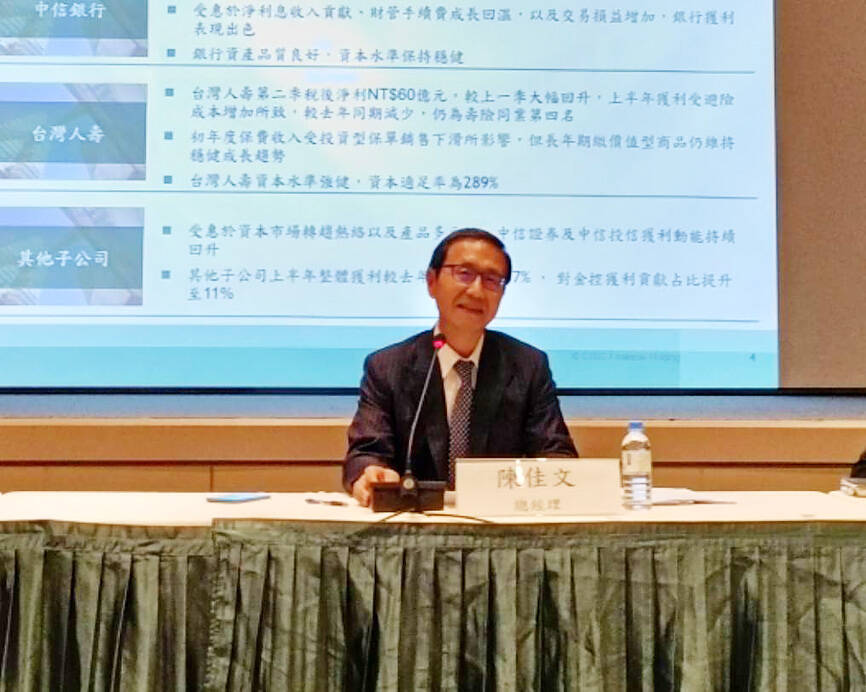CTBC Financial Holding Co (中信金控) expects another year of record profit, as bullish global financial markets are boosting its wealth management business and the company’s overseas expansions are starting to pay off, CTBC Financial president James Chen (陳佳文) told investors yesterday.
The Taipei-based financial conglomerate earned NT$56.08 billion (US$1.79 billion) in net income last year, up 79.3 percent from 2022, with earnings per share of NT$2.82, its strongest performance for the second consecutive year.
The strong performance last year was mainly due to a lower comparison base in the previous year, higher capital gains from insurance business and more currency swap gains at its banking business, CTBC Financial said.

Photo: Lee Chin-hui, Taipei Times
The company plans to distribute a cash dividend that would be higher than the NT$1.25 per share it offered a year earlier, Chen said.
CTBC Bank (中國信託銀行) last year earned NT$41.33 billion, up 11.3 percent from a year earlier, Chen said.
The bank generated NT$19.45 billion in profit from its overseas operations, recording year-on-year growth of more than 30 percent as consumer and institutional banking, as well as investment trading, showed relatively balanced improvement, he said.
“CTBC Bank should post record earnings this year, in the absence of major shocks,” he said, citing robust wealth management and timely gains from overseas branches.
Investment confidence has shown solid growth this year, thanks to robust capital markets at home and abroad, he said.
Regarding overseas operations, branches in Hong Kong and China accounted for 44 percent of profit, branches in Southeast Asia contributed 31 percent, and those in North America and Japan accounted for 12.8 percent, Chen said.
Investments aimed at global supply chain realignment are bearing fruit, with branches in Hong Kong and Singapore last year posting respective revenue of NT$7.3 billion and NT$2 billion, the best among Taiwanese banks in those areas, he said.
The Singaporean branch might significantly narrow its profitability gap with Hong Kong in three years due to its rising importance as a regional financial hub in Southeast Asia, he added.
As for CTBC’s life insurance subsidiary, Taiwan Life Insurance Co (台灣人壽), uncertainty linked to foreign currency exchanges remains a challenge, but should be less unpredictable compared with last year, he said.
Taiwan Life should post decent profit growth this year, despite foreign exchange volatility, he said.
As of December last year, CTBC Financial’s combined bad loan ratios was 0.52 percent, while coverage ratios were at about 309.6 percent, which demonstrates the resilience of the group’s assets, it said.

CHIP RACE: Three years of overbroad export controls drove foreign competitors to pursue their own AI chips, and ‘cost US taxpayers billions of dollars,’ Nvidia said China has figured out the US strategy for allowing it to buy Nvidia Corp’s H200s and is rejecting the artificial intelligence (AI) chip in favor of domestically developed semiconductors, White House AI adviser David Sacks said, citing news reports. US President Donald Trump on Monday said that he would allow shipments of Nvidia’s H200 chips to China, part of an administration effort backed by Sacks to challenge Chinese tech champions such as Huawei Technologies Co (華為) by bringing US competition to their home market. On Friday, Sacks signaled that he was uncertain about whether that approach would work. “They’re rejecting our chips,” Sacks

NATIONAL SECURITY: Intel’s testing of ACM tools despite US government control ‘highlights egregious gaps in US technology protection policies,’ a former official said Chipmaker Intel Corp has tested chipmaking tools this year from a toolmaker with deep roots in China and two overseas units that were targeted by US sanctions, according to two sources with direct knowledge of the matter. Intel, which fended off calls for its CEO’s resignation from US President Donald Trump in August over his alleged ties to China, got the tools from ACM Research Inc, a Fremont, California-based producer of chipmaking equipment. Two of ACM’s units, based in Shanghai and South Korea, were among a number of firms barred last year from receiving US technology over claims they have

BARRIERS: Gudeng’s chairman said it was unlikely that the US could replicate Taiwan’s science parks in Arizona, given its strict immigration policies and cultural differences Gudeng Precision Industrial Co (家登), which supplies wafer pods to the world’s major semiconductor firms, yesterday said it is in no rush to set up production in the US due to high costs. The company supplies its customers through a warehouse in Arizona jointly operated by TSS Holdings Ltd (德鑫控股), a joint holding of Gudeng and 17 Taiwanese firms in the semiconductor supply chain, including specialty plastic compounds producer Nytex Composites Co (耐特) and automated material handling system supplier Symtek Automation Asia Co (迅得). While the company has long been exploring the feasibility of setting up production in the US to address

OPTION: Uber said it could provide higher pay for batch trips, if incentives for batching is not removed entirely, as the latter would force it to pass on the costs to consumers Uber Technologies Inc yesterday warned that proposed restrictions on batching orders and minimum wages could prompt a NT$20 delivery fee increase in Taiwan, as lower efficiency would drive up costs. Uber CEO Dara Khosrowshahi made the remarks yesterday during his visit to Taiwan. He is on a multileg trip to the region, which includes stops in South Korea and Japan. His visit coincided the release last month of the Ministry of Labor’s draft bill on the delivery sector, which aims to safeguard delivery workers’ rights and improve their welfare. The ministry set the minimum pay for local food delivery drivers at